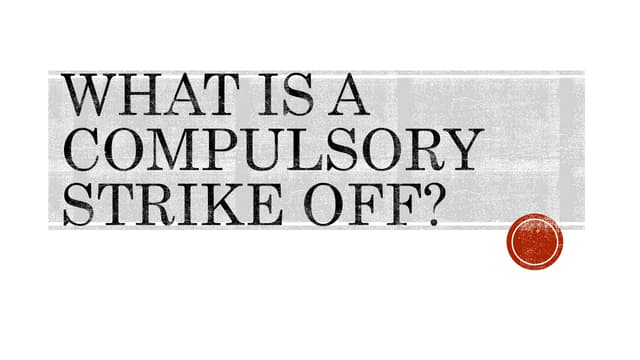Key Actions In the Compulsory Strike Off Refine
Key Actions In the Compulsory Strike Off Refine
Blog Article
Recognizing the Process and Effects of Compulsory Strike Off Under Firm Legislation
In the world of company regulation, the procedure and implications of obligatory strike off hold substantial weight for companies and their directors. Comprehending the intricacies of why companies encounter such an outcome, the meticulous steps included in the strike off procedure, and the far-reaching ramifications for all parties entailed is essential in browsing the complicated landscape of company governance. As we look into the reasons behind required strike offs, the following treatments, and the succeeding effects, a clearer picture arises of the extensive effect it can carry entities and individuals alike.
Factors for Compulsory Strike Off
Mandatory strike off under company law is started by the regulatory authorities for details reasons connected to non-compliance or operational abnormalities. The key factor for a company to deal with compulsory strike off is the failure to file annual returns or economic declarations for a prolonged period. This non-compliance suggests an absence of openness and adherence to governing requirements, elevating worries concerning the firm's monetary health and liability.

Process of Strike Off
Provided the governing authority's initiation of mandatory strike off for various factors, comprehending the process of strike off is critical for business encountering prospective dissolution under firm regulation. The process typically begins with the regulatory authority sending notices to the business's registered workplace address, informing them of the upcoming strike off. It is important for the company to address any exceptional issues, such as submitting past due documents or settling outstanding costs, within the specified duration to prevent dissolution.

Effects for Firms
What are the ramifications for firms encountering compulsory strike off under company legislation? Firms encountering required strike off may come across a number of considerable implications.
Additionally, the company's properties at the time of strike off come to be residential property of the state, which can bring about monetary losses for investors and lenders. Shareholders might shed their financial investments, while financial institutions might have a hard time to recover any arrearages owed to them by the struck-off business.
In addition, directors of the company might deal with disqualification from holding comparable placements in other firms for a given duration (first gazette notice for compulsory strike off). This can stain their professional online reputation and limit their future organization chances
Repercussions for Directors
Facing mandatory strike off under business legislation can have severe implications for supervisors, affecting their future duties in other firms and potentially tarnishing their specialist standing. Directors of a business dealing with required strike off might locate it testing to secure directorial placements in other firms in the future. This is since the strike off first gazette notice suggests a failing to abide with lawful responsibilities, increasing concerns about the director's capability to meet their responsibilities properly. Additionally, the tainted professional online reputation arising from a compulsory strike off can result in a loss of trust from organization clients, stakeholders, and companions. Directors may likewise deal with personal financial liabilities if they are located to have acted negligently or fraudulently, causing possible legal activities against them. Generally, the consequences of mandatory strike off for supervisors prolong past the details firm in inquiry, affecting their job leads and expert credibility in the long-term.
Preventing Compulsory Strike Off

Conclusion
Finally, recognizing the procedure and implications of compulsory strike off under company regulation is important for companies and supervisors to ensure conformity with guidelines. By recognizing the factors for strike off, the procedure included, and the consequences for all celebrations involved, firms can take steps to prevent undergoing obligatory strike off. It is necessary for supervisors to be positive in keeping correct records and conference legal commitments to protect against the risk of strike off.
Offered the regulatory authority's initiation of required strike off for various factors, comprehending the procedure of strike off is critical for firms dealing with possible dissolution under firm law.What are the implications for firms facing compulsory strike off under business law?Encountering required strike off under company regulation can have extreme ramifications for supervisors, affecting their future functions in other firms and possibly tarnishing their expert standing. Directors of a business facing obligatory strike off might locate it challenging to protect directorial placements in various other companies in the future.In final thought, understanding the procedure and ramifications of obligatory strike off under firm regulation is vital for supervisors and firms to ensure conformity with policies.
Report this page